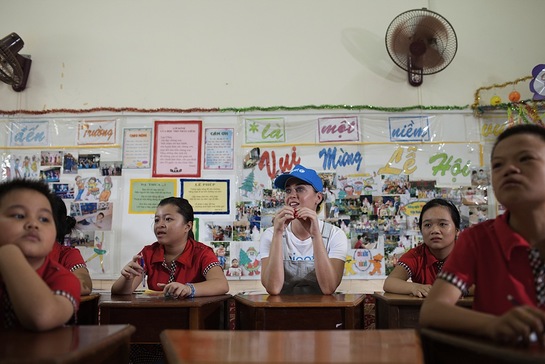Following a visit to Viet Nam, internationally acclaimed singer-songwriter and UNICEF Goodwill Ambassador Katy Perry is calling for increased focus on children being left behind in one of Asia’s fastest growing economies.

Credit/Copyright: UNICEF/UN020123/Quan
Katy Perry was in rural Ninh Thuan province, among the poorest and most remote regions of Viet Nam. She visited UNICEF programmes aimed at ending exclusion for children with disabilities, and also saw the organization’s work in child survival, education and early childhood development; water, sanitation and hygiene; and climate change, in a particularly challenging environment.
“It was heartbreaking to meet a grandmother who was left to care for four grandchildren after her daughter passed away. The family lives off a bumpy path in a remote village in the hills, and one of the grandchildren, a five-year-old named Linh*, became severely malnourished. If a UNICEF-trained outreach worker had not come to the village, and made sure Linh got the care she needed, she might not be alive today,” said Katy Perry. “Linh is one of millions of children who face such challenges every day. That’s something we should all be worried about,” said Katy.
On top of poverty, which traps families in intergenerational cycles of deprivation, many of the country’s most vulnerable children and families now have to deal with the effects of climate change. A lack of access to clean water and sanitation, combined with long periods of drought, means children are even more prone to malnutrition and disease.
According to the World Bank income classification Viet Nam has now ‘graduated’ to become a lower-middle-income country. However, in rural areas such as the province Katy visited, children continue to suffer from deprivation and rampant and pervasive poverty stands in sharp contrast to the progress evident in big cities.
According to UNICEF, there has been a reduction in child poverty but this progress – while impressive – is only part of the story. Circumstances beyond a child’s control continue to deny some of them a fair chance to realize their potential. Continued support is required to reach the children left out but as the country advances economically, it is important that the focus on trade and business development does not displace investment in children’s well-being and development, particularly in hard to reach ethnic minority areas.
Katy’s visit aims to draw attention to critical issues impacting the millions of children who are not benefitting equally from prosperity, such as the majority of those living in Ninh Thuan. Many of them told her that they didn’t want to follow in the footsteps of their parents – they dream of being doctors and teachers and breaking the cycle of poverty their parents are living in.
“All the children I met have incredible dreams. We have to help them fight for those dreams. Investing in the most disadvantaged to give them a fair chance in life is not only the right thing to do, it is the best way to break the cycle of poverty and drastically improve children’s health, education and well-being,” said Katy.
In some regions, half of children live in absolute poverty and one in every five do not go to school. Around 50 per cent of children in these regions do not receive adequate health care, leading to high numbers of child deaths from preventable diseases every single day.
Children from ethnic minorities — which account for some 15 per cent of the total population in the country — continue to face exclusion and limited opportunities. Those who don’t speak Vietnamese as a first language find themselves behind at school and with very slim chances of achieving the levels of education which can lift them out of poverty. UNICEF and the government of Viet Nam are working together to break down the language barriers faced by children from ethnic minorities with the aim of giving them the opportunity to learn the primary school curricula in their mother-tongue language.
“On my first day in Ninh Thuan, I visited a school that provides children with disabilities the support they need to thrive alongside their peers. I also visited a junior high school mainly made up of students from ethnic minorities who were empowered by the opportunity to have access to higher education,” said Katy.
Across all its programmes in Viet Nam, UNICEF supports the government and other partners to pursue an equal agenda for all children in the country and especially for children from ethnic minorities and low income families, children with disabilities, and children at risk of exploitation and abuse.
“UNICEF works to ensure that every child, urban or rural, rich or poor, has a chance to thrive, to grow and to contribute to their families and communities as well as to have the opportunity to shape the world that we live in,” said Katy.





